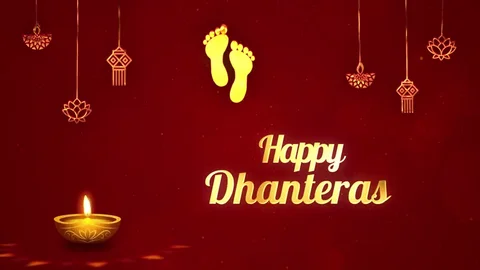
Dhanteras[1] (Hindi: धनतेरस), also known as Dhanatrayodashi (Sanskrit: धनत्रयोदशी), is the first day that marks the festival of Diwali in most of India.
It is celebrated on the thirteenth lunar day (Trayodashi) of Krishna Paksha (dark fortnight) in the Hindu calendar month of Ashvin (according to the amanta tradition) or Kartika (according to the purnimanta tradition). Dhanvantari, who is also worshipped on the occasion of Dhanteras, is considered the god of Ayurveda who imparted the wisdom of Ayurveda for the betterment of mankind and to help rid it of the suffering of disease.[2] The Indian ministry of Ayurveda, Yoga and Naturopathy, Unani, Siddha and Homeopathy, announced its decision to observe Dhanteras, as the “National Ayurveda Day”, which was first observed on 28 October 2016.[3]
Celebrations[edit]
Dhanteras is the worship of Dhanvantari. Dhanvantari, according to Hindu traditions, emerged during Samudra Manthana, holding a pot full of amrita (a nectar bestowing immortality) in one hand and the sacred text about Ayurveda in the other hand. He is considered to be the physician of the devas.[4]
The festival is celebrated as Lakshmi Puja, which is performed in the evenings when lamps of clay (diyas) are lit. Bhajans or devotional songs are sung in praise of goddess Lakshmi and traditional sweets are offered to the goddess. A peculiar custom in Maharashtra exists where people lightly pound dried coriander seeds with jaggery and offer the mixture as naivedhya.
On Dhanteras, homes that have not yet been cleaned in preparation for Diwali are thoroughly cleansed and whitewashed. Dhanvantari, the god of health and Ayurveda, is worshiped in the evening. The main entrance is decorated with colorful lanterns, holiday lights, and traditional motifs of rangoli designs are made to welcome Lakshmi, the goddess of wealth and prosperity. Small footprints are drawn with rice flour and vermilion powder all over the house to indicate her long-awaited arrival. On the night of Dhanteras, diyas (lamps) are ritually kept burning all through the night in honour of Lakshmi and Dhanvantari.[5]
Hindus consider this an extremely auspicious day for making new purchases, especially of gold or silver articles and new utensils. It is believed that new “Dhan” (wealth) or some item made of precious metal is a sign of good luck. In modern times, Dhanteras has come to be known as the most auspicious occasion for buying gold, silver, and other metals, especially kitchenware. The day also sees heavy purchases of appliances and automobiles.
On this night, the lights are set out in the sky lamps and as offerings at the base of a tulasi plant and in the form of diyas, which are placed in front of the doorways of homes. This light is an offering to Yama, the god of death, to avert untimely death during the time of the Diwali festival. This day is a celebration aimed at increasing wealth and prosperity. Dhanteras engages themes of cleansing, renewal, and the securing of auspiciousness as embodied by Lakshmi.[6]
In the villages, cattle are adorned and worshiped by farmers as their main source of income.
Within India[edit]
In South India (especially Tamil Nadu), Brahmin women make marundu, which translates as ‘medicine’ on the eve of Naraka Chaturdashi, which is Dhanatrayodashi. The marundu is offered during the prayer and eaten early on Naraka Chaturdashi before sunrise. Many families hand over the recipes of the medicine to their daughters and daughters-in-law. The marundu is consumed to eliminate the imbalance of tridoshas in the body.
Usually, Gujarati families will enjoy a meal of daal baath and malpua to ring in the new year.[7]
Significance[edit]
On the day of Dhanatrayodashi, the goddess Lakshmi is believed to have appeared from the ocean of milk during the churning of the ocean. Hence, the goddess Lakshmi is worshipped on the day of Trayodashi.
According to a popular legend, when the devas and asuras performed the Samudra Manthana (churning of the ocean) for amrita (the divine nectar of immortality), Dhanvantari (the physician of the Gods and an incarnation of Vishnu) emerged carrying a jar of the elixir on the day of Dhanteras.[6]




